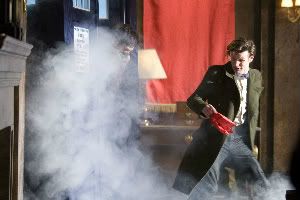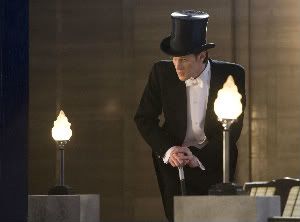Reviews | |||||
| List: |
| ||||
 Doctor Who: Series Six - Let's Kill Hitler Written by Steven Moffat Directed by Richard Senior Broadcast on BBC1 - 27th August 2011 Blimey. It is quite something when a series with so many known parameters and constituent elements can still be juggled together and delivered in a fresh manner. And yet Steven Moffat once again manages to do just that in Let's Kill Hitler! For instance, regeneration. Back in The Christmas Invasion we learn that Time Lords are in a state of flux during the first fifteen hours where-in their bodies can 'regenerate' any damage. Then, in Journey's End the Doctor reveals that residual regenerative energy can be siphoned off into an appropriate vessel. For Let's Kill Hitler, Moffat skillfully revisits those ideas in the form of River, at one point reveling in her ability to shake off a hail of bullets, and then ultimately channeling her own energy into the Doctor to save him. Then, for River herself, the signposts were pretty easy to read that the little girl from Day of the Moon was going to be her, cemented in A Good Man Goes To War with her being conceived in the time vortex within the TARDIS; but then not only does Moffat play a neat trick by having us first think it is River in the red corvette at the start only to see Mels instead, reveal her as a childhood friend of Amy and Rory, only then to further reveal it really was River after all! (why didn't I pick up on the name "Mels" straight away?!!!). Not only that, Moffat also gently guides us into preparation for the possibility of a black Doctor! The stuff with Hitler was amusing, especially as the eponymous character is actually only a comedy sideline - though he did of course play a pivotal role in "killing" Mels, which is quite ironic considering it was her suggestion to go kill him! And of course nobody knew the Teselecta crew were also there for similar reasons!  As usual with Doctor Who, it is so easy to be taken along for the ride from beginning to end, and the cracks in the plot are easily plastered up by the sheer pace and display put on. One crack in particular that stuck out for me was quite how Mels ended up where she was. We see the young Melody regenerate into her at the end of Day of the Moon ... but this was in 1969(ish) and River says she only changed this once, so how did a young black girl get from New York City to Leadworth, not to mention being "born" at least couple of decades before her parents? Time Lords (should we call her that?) may age differently from humans, but then she seemed to match up with them rather well. Mind you, this could be a previously unknown facet of Time Lord physiology that they can control how they age (possibly borne out by an aside by River on getting younger tonight?). As usual with Doctor Who, it is so easy to be taken along for the ride from beginning to end, and the cracks in the plot are easily plastered up by the sheer pace and display put on. One crack in particular that stuck out for me was quite how Mels ended up where she was. We see the young Melody regenerate into her at the end of Day of the Moon ... but this was in 1969(ish) and River says she only changed this once, so how did a young black girl get from New York City to Leadworth, not to mention being "born" at least couple of decades before her parents? Time Lords (should we call her that?) may age differently from humans, but then she seemed to match up with them rather well. Mind you, this could be a previously unknown facet of Time Lord physiology that they can control how they age (possibly borne out by an aside by River on getting younger tonight?).But that's a minor niggle in amongst the gems, especially in the acting. The interplay between Matt Smith as the Doctor, and Nina Toussaint-White/Alex Kingston as Melody was great fun, and I should also mention Caitlin Blackwood being as enchanting as ever as both the young, innocent Amelia and the TARDIS's voice interface - "fish fingers and custard" was worthy of a great cheer! I must admit I didn't find sub-plot of the crew on the Teselecta as interesting as what was revolving 'outside'. The antibodies almost felt like a contrived "alien of the week" was needed to menace our regulars, and the crew's mission to punish those who have committed heinous crimes might have been laudable except that it was (a) torture, and (b) they didn't seem to care that much about others they happened to steal identities off to reach their goal either. Still, I don't think we've seen the last of them ... On the other hand River goes from strength to strength. The wibbly wobbly timey wimey way in which we've encountered her has been one of the most fun elements of recent series, and now we have her arising phoenix-like into the Doctor's life for the first time (her perception). And full credit to the consummate ability of Alex Kingston to bring River 'to life' as someone totally ignorant of who she will become to the Doctor (and us) yet the little quirks of her personality we know and love literally evolving as the episode progresses. There are still some big gaps in her life though, but these quite possibly will feature in future storylines! And I'm looking forward to them! Back to intriguing ideas, as well as the question of Time Lord's "ethnicity" neatly answered this episode, there's also the moment when River ploughs all her remaining lives into the Doctor - have we just seen Moffat's masterplan for the Doctor to continue on beyond his thirteenth incarnation subtly put into motion ... (or did she really use up 504 lives if you accept the Death of the Doctor comment of course!) I'll leave you with an even more subtle idea, which maybe even Moffat hasn't considered (not that I believe that for one moment, nothing he writes is throwaway!); this series has effectively revealed with River that it is possible to 'reboot' the Time Lords (well, Time Lord-like beings) as a more innocent race to once again inhabit the universe ... Filters: Series 6/32 Television Eleventh Doctor | |||||
 Doctor Who: Series Six - Let's Kill Hitler Written by Steven Moffat Directed by Richard Senior Broadcast on BBC1 - 27th August 2011 This review contains plot spoilers and is based on the UK broadcast of the episode.
Matt Hills is the author of Triumph of a Time Lord, and is currently reviewing Torchwood: Miracle Day for the Antenna blog.
Filters: Series 6/32 Eleventh Doctor Television | |||||
 As usual with Doctor Who, it is so easy to be taken along for the ride from beginning to end, and the cracks in the plot are easily plastered up by the sheer pace and display put on. One crack in particular that stuck out for me was quite how Mels ended up where she was. We see the young Melody regenerate into her at the end of Day of the Moon ... but this was in 1969(ish) and River says she only changed this once, so how did a young black girl get from New York City to Leadworth, not to mention being "born" at least couple of decades before her parents? Time Lords (should we call her that?) may age differently from humans, but then she seemed to match up with them rather well. Mind you, this could be a previously unknown facet of Time Lord physiology that they can control how they age (possibly borne out by an aside by River on getting younger tonight?).
As usual with Doctor Who, it is so easy to be taken along for the ride from beginning to end, and the cracks in the plot are easily plastered up by the sheer pace and display put on. One crack in particular that stuck out for me was quite how Mels ended up where she was. We see the young Melody regenerate into her at the end of Day of the Moon ... but this was in 1969(ish) and River says she only changed this once, so how did a young black girl get from New York City to Leadworth, not to mention being "born" at least couple of decades before her parents? Time Lords (should we call her that?) may age differently from humans, but then she seemed to match up with them rather well. Mind you, this could be a previously unknown facet of Time Lord physiology that they can control how they age (possibly borne out by an aside by River on getting younger tonight?). Home Region:
Home Region:
